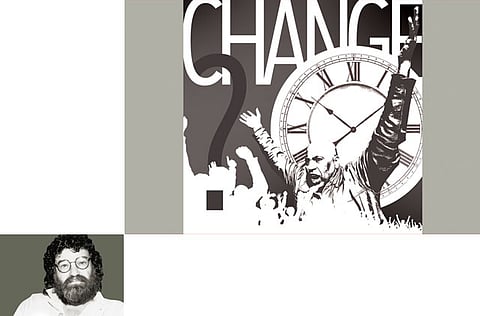No guarantee Arab Spring will end well
Bring a life jacket along — just in case

It’s not too early in the game, you will agree, to raise the question: Has Egypt’s been a failed revolution? Nor is it too early to ask, more broadly, whether the hopes engendered by the uprisings of the Arab Spring elsewhere in the Arab world have dimmed.
Though Egypt held a seemingly free presidential election, the country does not appear to be on a path leading it to political stability and economic prosperity. President, Mohammad Mursi, not unlike his deposed predecessor, Hosni Mubarak, has appropriated for himself enormous executive, legislative and judicial authority. His government, again using tactics reminiscent of the previous regime, has solidified its control as it went about silencing dissent, clamping down on the media and conducting a campaign of intimidation against NGOs, whose role is to nurture an independent civil society.
When a government, for example, feels so threatened by a popular television satirist, as Egypt’s was by Bassem Yousuf, that it indicts him for “insulting the head of state” and holds him for nearly five hours for interrogation before releasing him on bail, we are talking about an insecure, deeply polarised polity. The end result of all this is political and social unrest.
Syria, where close to 80,000 people have been killed and more than a million displaced, is in the throes of a deadly civil war.
Iraq, emerging from nine years of foreign occupation, remains a fractured, deeply divided and violent society gasping for breath and a sense of national self-definition. Yemen, with a long history of instability, continues to be unstable after its bloody brush with revolutionary change.
Libya’s new government, fragile from the outset after the overthrow of the ancient regime, has failed to disseminate central control, as warlords and sundry militias run free in the countryside where they are a law unto themselves.
In Jordan, the government has kept mass discontent at bay by introducing superficial change, such as dismissing ministers and expanding subsidies, while freedom of expression and assembly is severely restricted. In Algeria and Morocco, the protest movements that began in 2011 have fizzled out as the authorities cracked down on dissenters and co-opted others with a semblance of reform. In Palestine, Mahmoud Abbas’s Palestinian National Authority, as reported in the media several days ago, has gone down like a tonne of bricks on critics, interrogating, prosecuting and incarcerating journalists, bloggers and human rights activists when they raised their voices against nepotism, corruption and wastage in the administration, accusing them of “defaming the president”.
Truth be told, hackneyed expressions like “insulting the head of state” and “defaming the president” are beginning to wear thin.
So, two years after the onset of the Arab Spring, is the bloom off the rose?
Not quite. As the American novelist, Lawrence Niven, once remarked in his commentary on the ascendance of ideas that accompany revolutionary change, “Half of wisdom is learning what to unlearn”.
All of which brings us back to Egypt’s sputtering revolution. The first thing that the new government there has to unlearn is rule by command — rather than by consensus. The former is clearly the hallmark of autocracy, not democracy, which calls for a social contract between the ruler and the ruled and for the peaceful articulation of ideas in the media (a major building block of that democracy), even where those ideas are, well, satirical. That, in a nutshell, is the dream of the common man in the Arab world. “What takes us back to the past is our memories”, said the Shakespearian actor Jeremy Irons.
“What brings us forward is our dreams”.
All well and good, but there is no guarantee that the revolutions of the Arab Spring will end well. History is replete with tales of revolutions that failed, or that found their terminus in a wilderness of nowhere.
Consider, as a striking example, the Spring of Nations (sometimes known as the Springtime of the People) in 1848 — the most widespread revolutionary wave in European history that began in France and immediately spread, as if propelled by a mysterious collective force, to dozens of other countries in Western and Central Europe. Like the uprisings of the Arab Spring, those of the Spring of Nations erupted simultaneously, but independently of each other, with no coordination among the revolutionaries.
In time, however, the movement was co-opted by a well-entrenched and powerful old guard, as evidenced by the fact that in the post-revolutionary decade little had visibly changed. The Spring of Nations then passed into history.
Is that the fate that awaits the Arab Spring?
Addressing that same question in the current issue of Foreign Affairs, Sheri Berman, professor of Political Science at Columbia University, is convinced that the glass is half full. “The widespread pessimism about the fate of the Arab Spring is almost certainly misplaced”, she writes. “Of course, the Middle East has a unique mix of cultural, historical and economic attributes. But so does every region and there is little reason to expect the Arab world to be a permanent exception to the rules of political development. The year 2011 was the dawn of a promising new era for the region and it will be looked on as a historical watershed, even though the rapids downstream will be turbulent.”
That is fine, but I would bring a life jacket along — just in case.
Fawaz Turki is a journalist, lecturer and author based in Washington. He is the author of The Disinherited: Journal of a Palestinian Exile.


